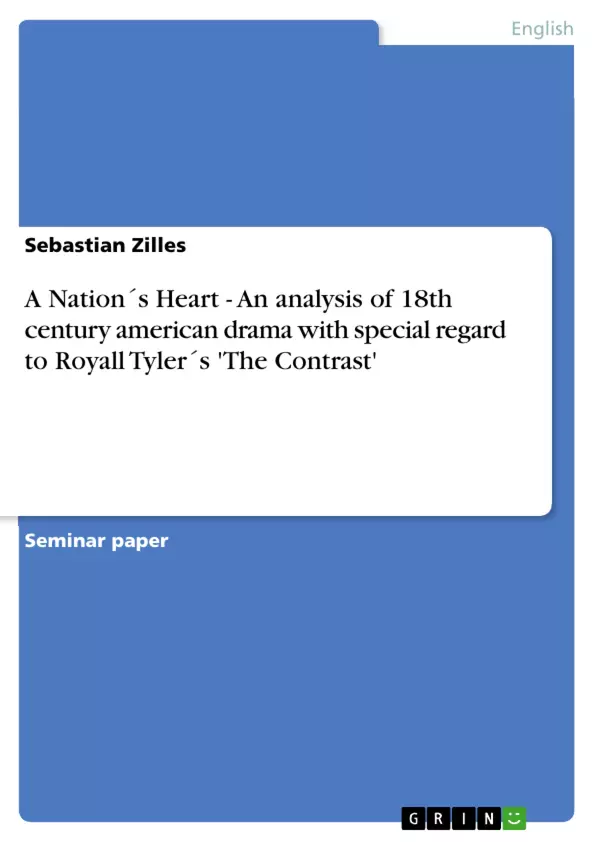Walter J. Meserve concludes in his work An Outline History of American Drama that many eighteenth century American plays “indicate little dramatic talent and were written more to criticize and to propagandize than to create a work of art, but the passion of some exhibited in these plays often strikes a spark of real life“ (38). Given this, Meserve portrays early American drama as a weapon with the ambition to educate its readers in a specific (American) way. In the same breath, this also means that the play´s form and its dramatic elements are less important than its implicit (political) message, which leads to the conclusion that early American drama is merely a political mouthpiece.
Contrariwise, this paper will show that besides educating its readers, early American plays should also be read as a work of art. This will be illustrated by Royall Tyler´s play The Contrast which is an outstanding example of the eighteenth century literature, combining political issues with formidable art. In summary, the overall question that will be answered in this study is: Which political issues of his time does Tyler portray in his comedy and which other readings of the play are possible? I assume that the political tendency is only one aspect. Above all, the paper will point out that the play is also construction of art and shows a special concept of utopia.
Table of Contents
- Introduction
- Eighteenth Century American Drama
- Brief Historical Survey
- American Theatre as a Devil's Den
- A Fight for Entertainment and Art
- A Nation's Heart
- Goals and Intension of Early American Plays
- The Image of the Imagined Community of a Nation
- Brief Historical Survey
- Text Analysis: The Contrast as an Interface of Three Different Tendencies
- The Contrast as a Political Play
- The Contrast as a Work of Art
- The Contrast and its Yankee Jonathan: a Case of Idealisation
Objectives and Key Themes
This paper aims to demonstrate that eighteenth-century American plays should be interpreted not only as political tools for education but also as works of art. Using Royall Tyler's "The Contrast" as an example, the paper will explore the interplay of political themes and artistic expression within the play. It will examine the political issues addressed in the comedy while highlighting alternative interpretations, emphasizing the play's construction as a work of art and its unique portrayal of utopia. Key themes explored in the paper include:- The role of early American drama as a tool for political education and cultural change.
- The development of an American theatre identity distinct from its European counterparts.
- The political themes and messages present in "The Contrast" and their relationship to the historical context of the time.
- The artistic merit and literary qualities of "The Contrast."
- The idealization of the Yankee Jonathan character and his representation of American identity.
Chapter Summaries
The introduction establishes the context for the study by citing Walter J. Meserve's view of early American drama as primarily political and propagandistic. The paper then proposes a counter-argument, suggesting that early American plays, particularly "The Contrast", should also be considered as works of art. The study will explore the political issues addressed in the play and the artistic elements contributing to its overall impact.
The second chapter delves into the historical context of eighteenth-century American drama, outlining the challenges and transformations the theatre underwent. It examines the prevailing negative perception of theatre as a "devil's den" and the subsequent efforts to promote its moral and cultural value. The chapter concludes by highlighting the emergence of a distinct American theatrical identity and its departure from European models.
Chapter three focuses on the text analysis of "The Contrast". It explores the political themes and messages present in the play, emphasizing its role as a platform for political commentary and social critique. The chapter then analyzes the artistic construction of the play, highlighting its literary and dramatic qualities. Finally, it examines the portrayal of the Yankee Jonathan character and his significance in shaping an idealized American identity.
Keywords
This paper examines the multifaceted nature of eighteenth-century American drama, focusing on its political and artistic dimensions. Key concepts include early American theatre, national identity, political commentary, "The Contrast", Royall Tyler, Yankee Jonathan, utopia, and the evolution of a distinct American dramatic tradition. The paper explores the interplay of these themes to reveal the complexity and significance of this era in American theatre history.Frequently Asked Questions
What is the central theme of Royall Tyler's 'The Contrast'?
The play explores the contrast between European artifice and American sincerity, addressing political issues of the 18th century while functioning as a significant work of art.
How was early American drama traditionally viewed by historians?
Historians like Walter J. Meserve often viewed early American plays primarily as political propaganda and tools for education rather than artistic achievements.
Who is 'Yankee Jonathan' in the context of American identity?
Yankee Jonathan is a character in 'The Contrast' who represents an idealized American identity, characterized by plainness, honesty, and a departure from European models.
What were the challenges for 18th-century American theater?
Theater was often perceived negatively as a "devil's den," and playwrights had to fight to establish it as a legitimate form of moral and cultural entertainment.
Does the paper argue that 'The Contrast' is only a political play?
No, the paper argues that while it has political tendencies, it should also be read as a sophisticated construction of art and a portrayal of utopia.
What is the historical significance of this analysis?
It highlights the emergence of a distinct American theatrical identity that moved away from European traditions during the nation's early years.
- Quote paper
- Sebastian Zilles (Author), 2008, A Nation´s Heart - An analysis of 18th century american drama with special regard to Royall Tyler´s 'The Contrast', Munich, GRIN Verlag, https://www.grin.com/document/114532



